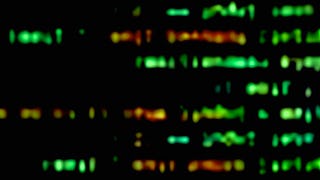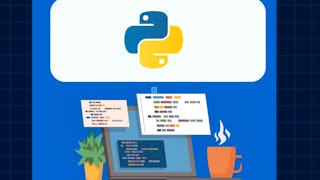This course introduces basic concepts of systems programming using a modern open source language. You will learn to apply basic programming concepts toward solving problems, writing pseudocode, working with and effectively using basic data types, abstract data types, control structures, code modularization and arrays. You will learn to detect errors, work with variables and loops, and discover how functions, methods, and operators work with different data types. You will also be introduced to the object paradigm including classes, inheritance, and polymorphism.



(19 avis)
Expérience recommandée
Compétences que vous acquerrez
- Catégorie : Data Structures
- Catégorie : Computer Programming
- Catégorie : Object Oriented Programming (OOP)
- Catégorie : Software Design
- Catégorie : Unified Modeling Language
- Catégorie : System Programming
- Catégorie : File Management
- Catégorie : User Interface (UI)
- Catégorie : Debugging
- Catégorie : Python Programming
- Catégorie : Pseudocode
Détails à connaître

Ajouter à votre profil LinkedIn
Découvrez comment les employés des entreprises prestigieuses maîtrisent des compétences recherchées

Il y a 9 modules dans ce cours
Welcome to Introduction to Open Source Application Development! In this module, you will learn to install and configure Python and Visual Studio Code (VSC). You will gain proficiency in programming fundamentals, including declaring variables, describing data types, and implementing programming logic using flowcharts and pseudocode. Additionally, you will acquire the skills to perform arithmetic operations and effectively work with code in Visual Studio Code, culminating in the ability to upload your coding results to the appropriate platform.
Inclus
7 vidéos8 lectures4 devoirs1 sujet de discussion1 laboratoire non noté
Module 2 focuses on essential programming concepts and skills. You will learn to format output effectively, leveraging various techniques to present data clearly. Additionally, you will explore the importance of type conversion functions and how to use them proficiently. Finally, you will gain an understanding of the sequential flow of a program, mastering the art of designing programs that interact with users through input and output statements.
Inclus
4 vidéos5 lectures4 devoirs1 laboratoire non noté
In this module, you will learn how to utilize decision alternatives and construct decision structures using conditional statements like 'if' conditions. This essential skill will enable you to create dynamic and responsive programs that adapt their behavior based on specific conditions and criteria.
Inclus
3 vidéos5 lectures3 devoirs1 laboratoire non noté
In this module, you will learn how to construct nested loops to handle complex repetitive tasks efficiently. Additionally, you'll gain proficiency in constructing both 'For' and 'While' loops, empowering you to create versatile and optimized code for various scenarios, from iterative calculations to data processing.
Inclus
4 vidéos5 lectures4 devoirs1 laboratoire non noté
This module is designed to enhance your programming skills by focusing on key areas. You'll learn the art of debugging source code, equipping you with the ability to identify and resolve errors effectively. You will explore how to work with imported modules, expanding your code's functionality. And lastly, you'll delve into defining and implementing user-defined functions, enabling you to organize and streamline your code while building reusable blocks of logic for various applications.
Inclus
4 vidéos5 lectures4 devoirs1 laboratoire non noté
In this module, you will explore essential data manipulation skills. You will learn how to efficiently read and write data to and from files, a critical aspect of real-world data processing. Additionally, you'll master list manipulation techniques, including list slicing, and expand your capabilities by creating lists, including multidimensional ones, enabling you to handle and analyze structured data effectively.
Inclus
4 vidéos5 lectures4 devoirs2 laboratoires non notés
In this module, you will dive into object-oriented programming (OOP) principles and practices. You will demonstrate your understanding of unified modeling through UML class diagramming, a crucial skill for designing and visualizing software systems. You will also learn how to harness the power of inheritance to build upon existing classes, and you will create your own classes and class objects, paving the way for modular, efficient, and scalable software development.
Inclus
4 vidéos5 lectures4 devoirs1 laboratoire non noté
In this module, you will learn how to leverage the Tkinter module to create your own customized GUIs, giving you the ability to design user-friendly software interfaces. Furthermore, you will gain an understanding of the fundamental building blocks of GUIs as you describe and work with basic controls that constitute an interactive and visually engaging user interface.
Inclus
3 vidéos4 lectures3 devoirs1 laboratoire non noté
This module contains the summative course assessment that has been designed to evaluate your understanding of the course material and assess your ability to apply the knowledge you have acquired throughout the course. Be sure to review the course material thoroughly before taking the assessment.
Inclus
1 devoir
Obtenez un certificat professionnel
Ajoutez ce titre à votre profil LinkedIn, à votre curriculum vitae ou à votre CV. Partagez-le sur les médias sociaux et dans votre évaluation des performances.
Préparer un diplôme
Ce site cours fait partie du (des) programme(s) diplômant(s) suivant(s) proposé(s) par Illinois Tech. Si vous êtes admis et que vous vous inscrivez, les cours que vous avez suivis peuvent compter pour l'apprentissage de votre diplôme et vos progrès peuvent être transférés avec vous.¹
Instructeur

Offert par
En savoir plus sur Software Development
 Statut : Essai gratuit
Statut : Essai gratuit
Illinois Tech
 Statut : Essai gratuit
Statut : Essai gratuit
Illinois Tech
 Statut : Gratuit
Statut : Gratuit
Coursera Project Network


Board Infinity
Pour quelles raisons les étudiants sur Coursera nous choisissent-ils pour leur carrière ?





Ouvrez de nouvelles portes avec Coursera Plus
Accès illimité à 10,000+ cours de niveau international, projets pratiques et programmes de certification prêts à l'emploi - tous inclus dans votre abonnement.
Faites progresser votre carrière avec un diplôme en ligne
Obtenez un diplôme auprès d’universités de renommée mondiale - 100 % en ligne
Rejoignez plus de 3 400 entreprises mondiales qui ont choisi Coursera pour les affaires
Améliorez les compétences de vos employés pour exceller dans l’économie numérique
Foire Aux Questions
Access to lectures and assignments depends on your type of enrollment. If you take a course in audit mode, you will be able to see most course materials for free. To access graded assignments and to earn a Certificate, you will need to purchase the Certificate experience, during or after your audit. If you don't see the audit option:
The course may not offer an audit option. You can try a Free Trial instead, or apply for Financial Aid.
The course may offer 'Full Course, No Certificate' instead. This option lets you see all course materials, submit required assessments, and get a final grade. This also means that you will not be able to purchase a Certificate experience.
When you purchase a Certificate you get access to all course materials, including graded assignments. Upon completing the course, your electronic Certificate will be added to your Accomplishments page - from there, you can print your Certificate or add it to your LinkedIn profile. If you only want to read and view the course content, you can audit the course for free.
You will be eligible for a full refund until two weeks after your payment date, or (for courses that have just launched) until two weeks after the first session of the course begins, whichever is later. You cannot receive a refund once you’ve earned a Course Certificate, even if you complete the course within the two-week refund period. See our full refund policy.
Plus de questions
Aide financière disponible,
¹ Certains travaux de ce cours sont notés par l'IA. Pour ces travaux, vos Données internes seront utilisées conformément à Notification de confidentialité de Coursera.



